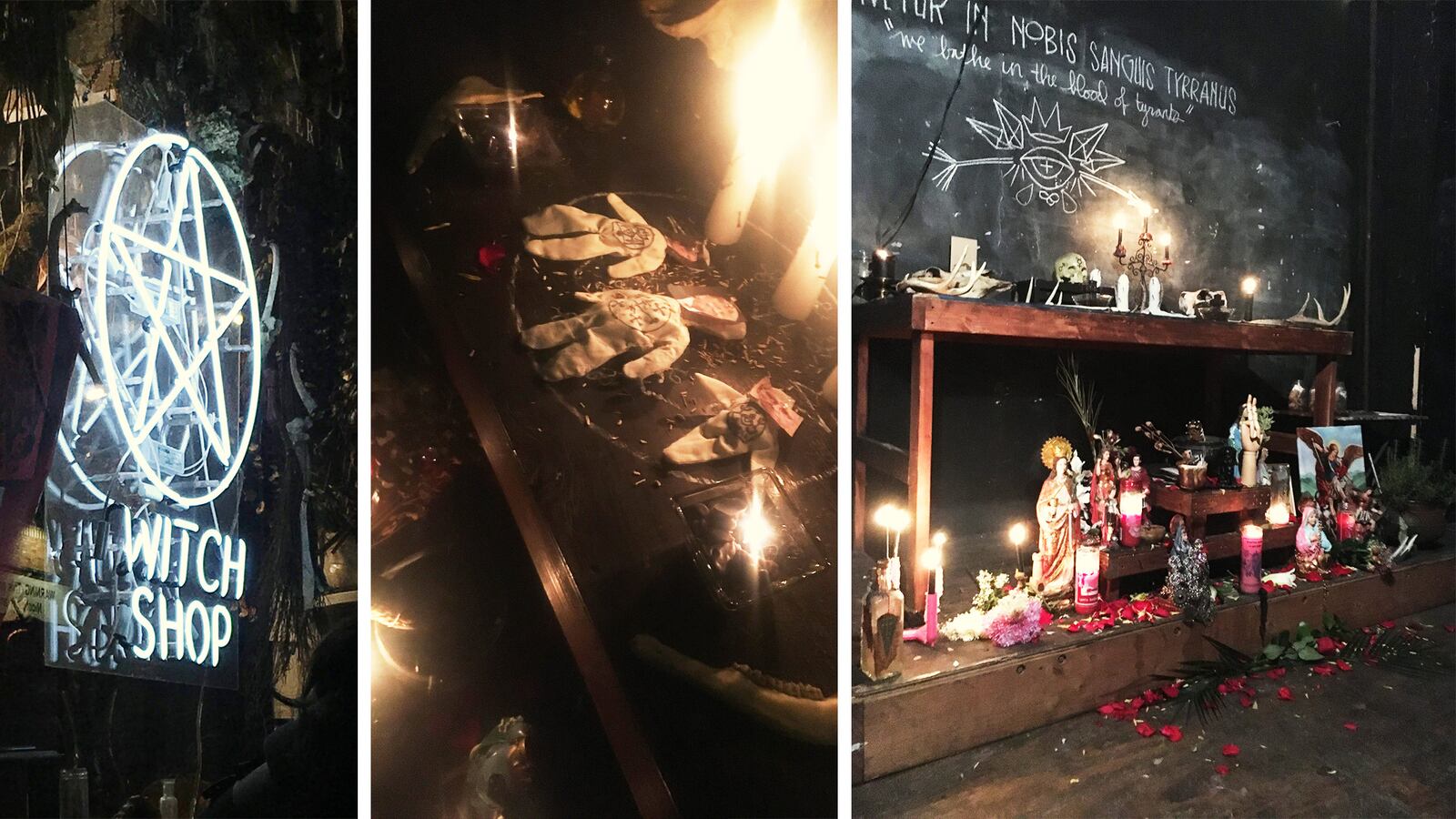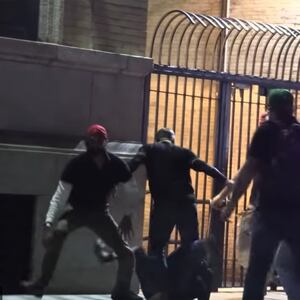You could see the protesters gathering outside the Hex on Brett Kavanaugh from the edge of an industrial block in Brooklyn. They could be heard from even farther down the street.
The mainly Christian-identifying crowd condemned the group of antifa witches who made headlines this week for planning to conjure misfortune onto the new Supreme Court justice.
The hex was hosted by Catland, an occult shop that sells spiritual literature, healing crystals, tarot cards, burnable incense, and other occult accoutrements.
Outside of the storefront, supporters stood guard. A row of people clad in antifa black bandannas and red pins kept a close eye on ticketed guests, ushering them into the small business by the handful.
Those waiting outside were subjected to spontaneous sermons from protesters and requests for interviews from unaccredited press such as a Russian newscast and Infowars.

The Monday before the hex, Catland's co-owner Dakota Bracciale told The Daily Beast that the shop had been getting death threats for planning the hex. “People are calling threatening to blow up the shop, saying ‘Just wait until the 20th, because we’re going to show up and you’re not going to see us coming,’” they said.
They described having to “sit down” with the NYPD the week before the hex to plan security. “As a queer, trans, disabled person who goes by they/them, I'm this SJW snowflake. I don’t want to sit down with cops,” Bracciale said. “The Christian right is making strange bedfellows right now.”
The night of the hex, the atmosphere was tense, but not threatening. One woman handed out mini-Bibles. A black and yellow sign read, “Jesus is God alone.”
When another man burst out into spontaneous “Hallelujahs,” a hexer retorted, “Hall-e-boo-yeah.”
Luis Winfield was among the protesters, telling The Daily Beast that he would spend the night “praying for (hexers) to realize they’re wrong.”
“I agree with them in terms of rapists aren’t good, but hatred isn’t going to change people,” he said. “God changes people.”
As a group of black women attempted to walk down the crowded sidewalk, one yelled, “There's too many white people!”

Even inside the tranquil, candlelit backroom of Catland, where the hex took place, guests could still hear impassioned yelling and gospel singing coming from the streets. “The sermon comes free,” Bracciale joked of an unseen woman’s condemnation. “It’s a double feature.”
As Bracciale set up the hex, which began forty-five minutes late due to the fracas, a few attendees began soft chanting to drum out the sound. Others called 311 to file noise complaints. When one man who had ceaselessly screamed about the witches’ “souls” abruptly shut up, someone joked, “I hope he busted a vocal cord.”
Bracciale made three effigies resembling Donald Trump, Brett Kavanaugh, and “Fuckface (Mitch) McConnell” as the focal point of rage during the rituals, but hex-goers were invited up by section to write down the names of their own abusers to bolster the spell.

Above the table that held the effigies and “dick candles” stabbed with needles, a chalk board read, “Lavetur in Nobis Sanguis Tyrannis,” which translates as “To bathe in the blood of tyrants.”
Not all guests were practicing witches, or even considered themselves spiritual. For many, the hex served as an outlet for fury.
Attendee Tracey Freeman has been to Catland a few times, but doesn’t actively practice witchcraft. “I thought this would be a cool act of solidarity,” she said. “It's healing for people who have experienced all different types of trauma to be in that space and be with other people with those experiences to discuss the power and love that emanates from people in spite of a world that’s against you.”
“Yes, there’s a nuts and bolts magical spell that happens in the room,” Bracciale explained. “But it’s just as potent of a ritual as it is an act of catharsis where people can recognize trauma and process through it.”
That’s why they opened the evening by encouraging all to hold a long, meditative “Om” chant. “You don’t have to believe it or have a spiritual path,” Bracciale instructed. “Say it as a rallying cry.”
So, with Christian rock blasting from the sidewalk, guests began the ceremony.
First, everyone read Psalm 109, which features devastatingly harsh lines of cursing. “If you want to curse a bitch, the Bible has some tips,” Bracciale joked of the passage, which includes lines like “Let his posterity be cut off” and makes reference to “blotting out” the scorned’s future generations.
Bracciale was far from the first spiritual figure to use Psalm 109 against a politician; in 2009, a California pastor named Reverend Wiley Drake cited it when praying for President Obama’s death.
Bracciale titled the second half of the ritual, “The Right of the Scorned One.” According to the organizer, “It is about the understanding and embracing of rage as a vital tool for survival, and not something that needs to be dampened down and buried.”
Rather than viewing anger as messy or immature, Bracciale wanted hexers to “understand the emotion as an ally.”
As Bracciale spewed out a burning soliloquy against abusers, the crowd became animated. People shouted, yipped, stomped on the ground in a scene that could have been straight out of a revivalist meeting—with about 200 percent more f-bombs.
Separated by just one thin wall, the beliefs of both hexers and protesters may have been different, but the expressive passion was equal. Catland owners recognize this.
“If you think about it, the right wing has church,” Bracciale said. “They have this infrastructure to go to during these tumultuous times, a sanctuary where they can find fellowship and camaraderie. But the left doesn’t have that. I think we’re really being tested right now, and there have to be these meetings where we’re there for each other.”
This was most evident during the hex's final moments, “Words of Affirmation.” Though attendees were not sitting in the round (chairs were stuffed in sections to make as much room as possible), a sort of talking circle prevailed.

First, everyone was instructed to close their eyes—but it wasn't mandatory. “If you don't feel comfortable closing your eyes, you probably have a good reason for thinking that,” Bracciale dryly said.
First, the room was silent—except for the the persistent protesting coming from outside. Slowly, people began to share stories of abuse, marginalization, or anger.
One person said, “My pronouns are not fucking preferred.”
More often than not, harrowing stories of assault were followed by “...and no one believed me.” The room that had been filled with such unbridled rage minutes earlier became only empathetic.
Though the safeness of the space was marred by the spectacle of getting in, and the constant shuttering of media photographer's cameras, a community prevailed. Hexers hoped that ensuing events would bring far less fanfare so that next time, they can focus their full attention on tapping into a network of survivors.

Catland witches have not yet begun to hex; two more are planned for 2018. Half of the $10 admission charge goes to local and national charities; on Oct. 20 selected organizations were Planned Parenthood and the Ali Forney Center, which supports New York's homeless LGBTQ youth.
Right before sending attendees back into the chilly October night, Bracciale asked, “How do you find trauma friends?” They weren't sure of the answer, but hoped that relationships could be forged through the evening's fellowship.
Then, as they leaned on a stack of chairs that ever-so-slightly resembled a pulpit, Bracciale led the group in a few rounds of deep breathing. The sound of many grounding inhales were muddled with quiet, tearful sniffles.







